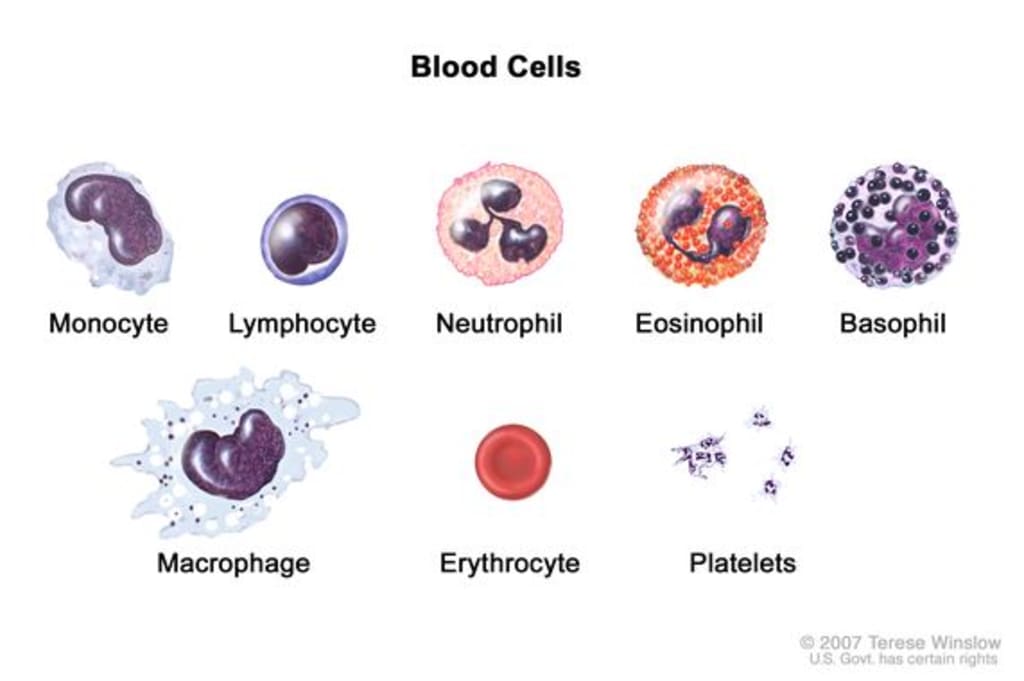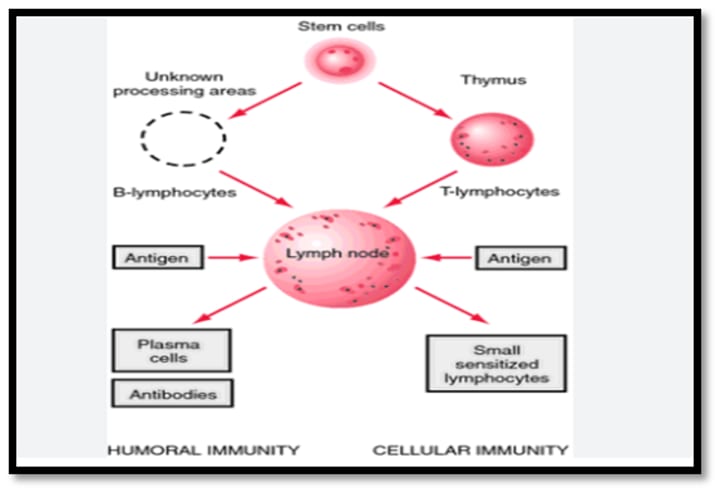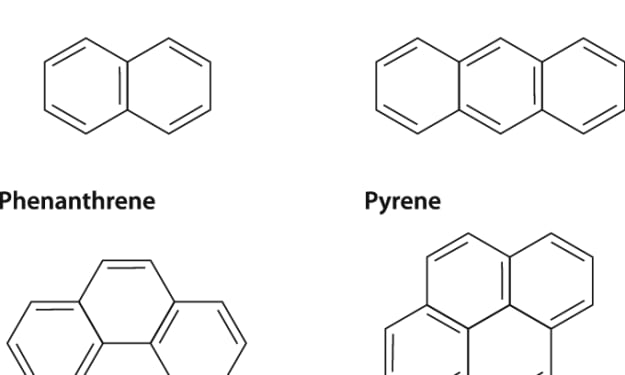Lymphocytes
Introduction, function, types and its formation

Lymphocytes:
Introduction:
Lymphocytes are a type of white blood cells that are important components of the immune system. These cells are in charge of identifying and eliminating foreign invaders like bacteria, viruses, and other diseases. Lymphocytes also encourage tissue healing and stop the growth of malignant cells.
Around 28–42% of the white blood cells in the body are lymphocytes, which are involved in the immune system's reaction to foreign substances in the body. The majority of lymphocytes has a tiny nucleus that takes up the majority of the cell and are just marginally larger than erythrocytes.
Some are larger and have more cytoplasm overall, some of which contains granules. Lymphocytes move slowly compared to granulocytes and monocytes, and they migrate in distinct ways outside of the circulation. The lymph nodes, spleen, tonsils, thymus, and lymphoid tissue of the digestive tract all contain considerable quantities of lymphocytes. Via lymphatic pathways that primarily empty into the thoracic lymph duct, which is connected to the venous system, they reach the circulatory system.
Lymphocyte types:
T lymphocytes, B lymphocytes, and natural killer (NK) cells are the three primary subtypes of lymphocytes. These several cell types each have a special function inside the immune system.
T cells: A particular class of lymphocyte known as T cells develops in the thymus gland. While cytotoxic T cells specifically target and kill malignant or diseased cells, helper T cells aid in the activation and coordination of other immune cells.
• Helper T cells: B cells and cytotoxic T cells, as well as other immune system cells, are activated by helper T cells. By identifying antigens on the surface of foreign cells, they accomplish this by secreting cytokines that activate the cells.
• Killer T cells, sometimes referred to as cytotoxic T cells, are in charge of eradicating virus- or other pathogen-infected cells. By adhering to antigens on the surface of infected cells, they may identify them and release the toxic substances that kill the infected cells.
• The immune response is regulated by regulatory T cells, sometimes called suppressor T cells. By reducing the activity of other immune cells, they stop the immune system from attacking healthy cells and tissues.
B cells: The lymphocyte class known as B cells is in charge of generating antibodies. They are created in the bone marrow and reach maturity in the lymph nodes and spleen. A B cell becomes activated and begins to divide when it comes into contact with an antigen that fits its unique receptor.
During this process, some of the B cells are transformed into plasma cells, which emit copious amounts of antibodies. Proteins known as antibodies are able to identify and bind to particular antigens, designating them for eradication by other immune system cells.
Memory B cells: Another subset of B cells that develop during an immune response are called B cells. These cells can quickly develop a response if the same antigen is met again in the future because they retain the memory of the antigen that caused their activation.
Natural killer (NK) cells: NK cells are a subtype of lymphocyte that can identify and eliminate malignant or contaminated cells without being exposed to or activated beforehand. These cells are crucial for managing viral infections and limiting the growth of malignant cells.
• They are referred to as "natural" since they don't need other immune system cells to activate them in order to work.
• By spotting alterations in the surface proteins of aberrant cells, natural killer cells can identify abnormal cells. They release toxic compounds that kill the target cell after they have located it.
Formation and Activity of Lymphocytes:
1. Specialized tissues, including the thymus gland and bone marrow, are where lymphocytes develop and mature. These cells circulate throughout the body after reaching maturity and may come into contact with foreign invaders while they do so.

Lymphocytes' Function in Immune Responses:
• Lymphocytes are essential components of the immune system because they both stop infections from starting and attack those that have already started. In the immune response, lymphocytes play a number of important functions:
• Production of antibodies: B cells create antibodies that bind to and recognise particular foreign chemicals, designating them for annihilation by other immune cells.
• Cell-mediated immunity: T cells are essential for cell-mediated immunity, which entails the specialised recognition and elimination of malignant or diseased cells.
• Immune memory: After being activated, a lymphocyte has the potential to build immunological memory, enabling a quicker and more efficient response to subsequent infections or malignant growths.
Disorders of lymphocytes:
Immune deficiencies, autoimmune diseases, and lymphatic system tumours are just a few of the health issues that can result from disorders of the lymphocytes.
• Immune deficiencies: Immune deficits are present when the immune system is unable to establish a successful defence against outside invaders. Several things, such as genetic abnormalities and specific drugs, can contribute to this.
• Autoimmune conditions: When the immune system unintentionally targets healthy cells and tissues, autoimmune conditions develop. Lupus, multiple sclerosis, and rheumatoid arthritis are a few examples of autoimmune disorders.
• Lymphomas: Cancers of the lymphatic system, which includes the spleen, bone marrow, and lymph nodes, are known as lymphomas. Hodgkin's lymphoma and non-lymphoma Hodgkin's are the two main varieties of lymphomas.
About the Creator
Enjoyed the story? Support the Creator.
Subscribe for free to receive all their stories in your feed. You could also pledge your support or give them a one-off tip, letting them know you appreciate their work.





Comments
There are no comments for this story
Be the first to respond and start the conversation.